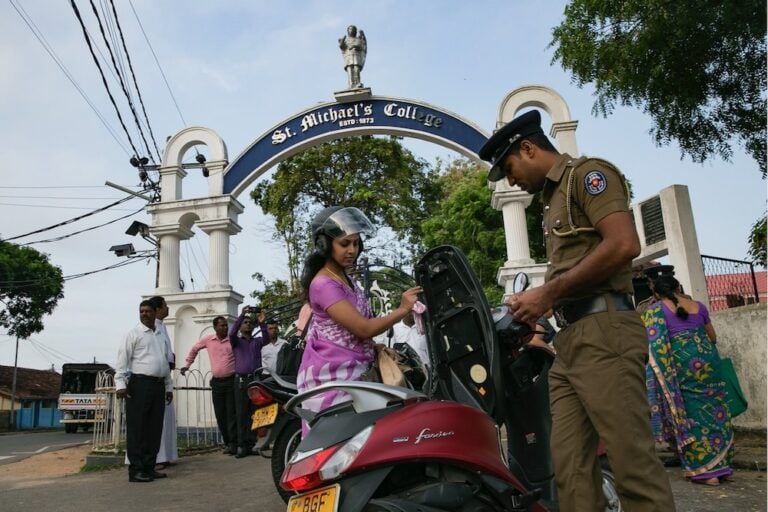(ARTICLE 19/IFEX) – The following is an ARTICLE 19 press release: 12 September 2000 Human rights group condemns Sri Lanka election violence and calls on Government to lift expression restrictions ARTICLE 19 today condemned the escalating number of killings and physical attacks apparently connected to October’s parliamentary elections and called upon the Sri Lankan government […]
(ARTICLE 19/IFEX) – The following is an ARTICLE 19 press release:
12 September 2000
Human rights group condemns Sri Lanka election violence and calls on Government to lift expression restrictions
ARTICLE 19 today condemned the escalating number of killings and physical attacks apparently connected to October’s parliamentary elections and called upon the Sri Lankan government to widen the space for peaceful political debate. The organisation cited three issues under official control as particularly likely to affect the conduct of the election campaign and the fairness of the process:
* the bid to continue nationwide emergency regulations during the election period(1)
* continued restrictions on reporting anything which may be viewed by the authorities as damaging to national security(2) and
* the ‘chilling’ effect caused by the suspended jail sentence handed down to editor Lasantha Wickrematunga by the Sri Lankan High Court on 5 September 2000(3).
Andrew Puddephatt, Executive Director of ARTICLE 19, today urged the Sri Lankan government to address these matters. He said:
“The government has an obligation to ensure that elections take place in an atmosphere where a wide range of opinions may be expressed peacefully. Maintaining island-wide emergency powers, suppressing all reporting and comment on one of the most crucial issues of the day, and holding the threat of legal action over journalists who raise issues considered inappropriate by politicians and public officials will not contribute to this goal.”
ARTICLE 19 has consistently condemned the violence perpetrated in Sri Lanka. The organisation maintains that increasing censorship, both formal and informal, will not address the problem and continues to call for the government to respect international standards on freedom of expression and to facilitate an environment where the roots of conflict can be addressed in an atmosphere of open debate. This is particularly important during elections, when people need to be able to make an informed political choice based on the widest possible range of information. Much of this will come from the media, which therefore needs to be able to operate critically without fear of political interference or other repercussions.
Notes for editors
1. The dissolved parliament will reconvene on 14 September to ratify the President’s proclamation extending emergency powers, which will then be in force until election day – 10 October 2000.
2. Restrictions in force breach international guarantees of freedom of expression, which only permit restrictions on the basis of national security under narrowly defined circumstances.
3. Lasantha Wickrematunga, editor of independent weekly The Sunday Leader, has been sentenced to two years in prison, suspended for five years, for criminal defamation of the President. International standards in this case have been breached in two ways: international courts have stated on numerous occasions public officials should tolerate greater criticism than private individuals; and imprisonment for expression-related offences is not acceptable.


